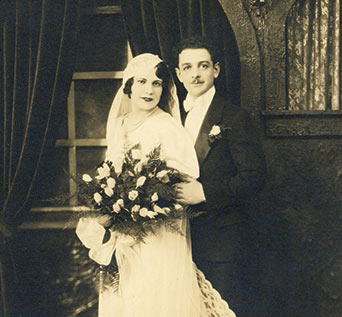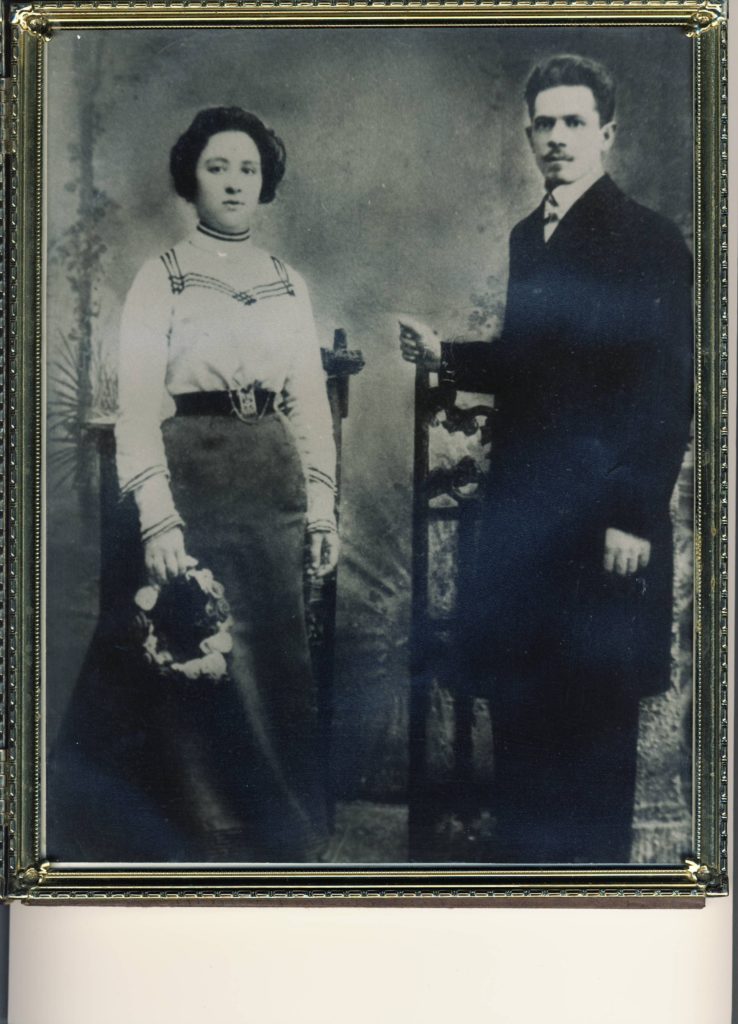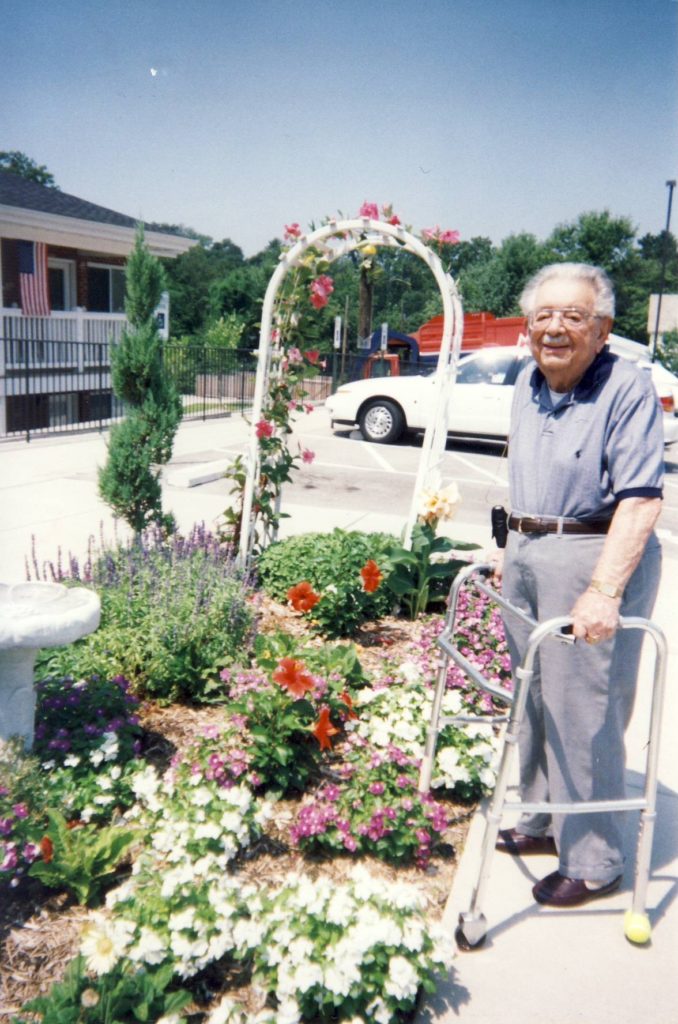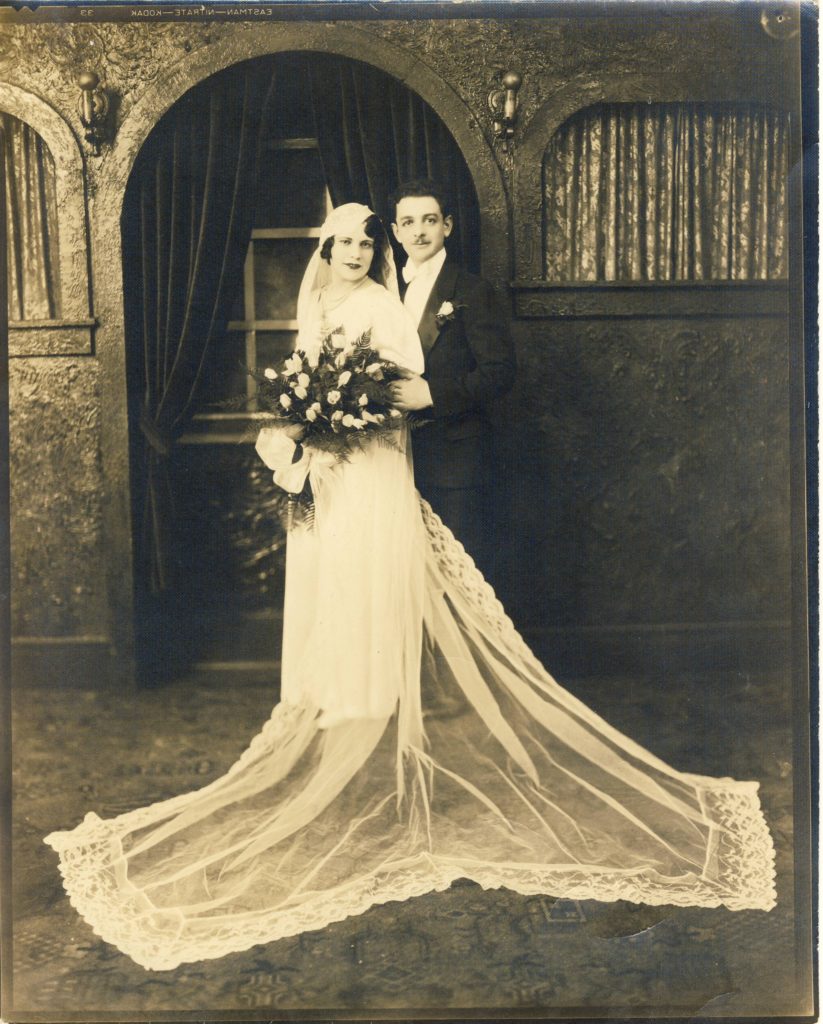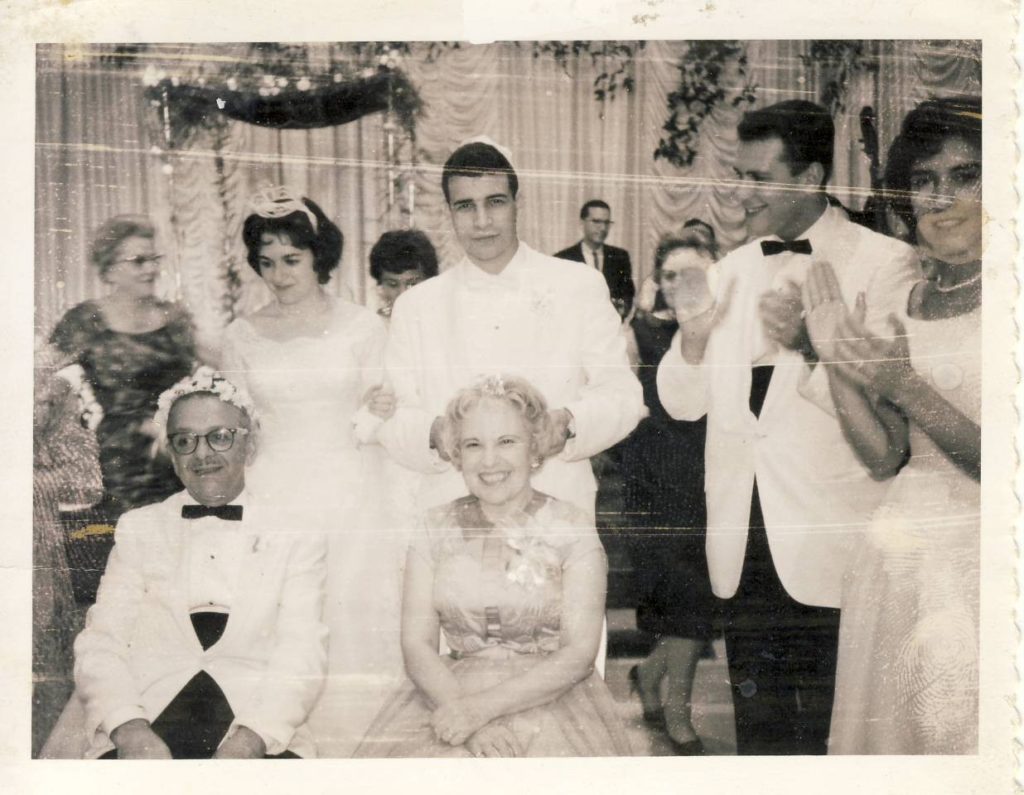PRINCE: My name is Vida “Sister” Prince. Today is August 22, 2003. I am interviewing Isadore Kammer for the Oral History Project at the Holocaust Museum and Learning Center. Mr. Kammer was born in 1906 in Russia, came to the United States in 1923. He will talk about the childhood and his early adult years, growing up in Russia with the background of World War I, the Russian Revolution, and Civil War. Lisa Pots is assisting as an audiologist in this interview.
KAMMER: I was born in Russia at the time of Beleya Tserkov. And I don’t recall the earlierst part of things. My memory isn’t that good. But I do remember Daisy started at twelve years old.
PRINCE: Well, may I ask you a question? Do you remember what your house looked like? And who lived in your house with you? Your mother? And tell me about, you have brothers or sisters? Tell me about your family when you were a child, okay?
KAMMER: Yes. I lived in the town of Beleya Tserkov in Russia and that’s really in the Ukraine. And two armies, two armies are fighting to get into the town to dominate. Their sick maybe or maybe just the town and.
POTS: Isadore, she wants to know who your family was. Your mother, your father.
KAMMER: My family was father and mother. The picture of my father and mother over there.
PRINCE: Okay. Could you get it for me Lisa? And your father’s name was what?
KAMMER: My father was Komornik.
PRINCE: That was your Russian name?
KAMMER: That was his name. That’s my father and mother.
PRINCE: Oh. Their handsome. They’re handsome people.
KAMMER: Yes they’re very good-looking people.
PRINCE: Yes they were. What did your father do?
KAMMER: My father was in the business of selling piece goods.
PRINCE: Piece goods.
KAMMER: You know what piece goods is?
PRINCE: Yeah, material…
KAMMER: I used to go to the Kiev, which was about 300 miles away, weekly to buy the piece goods and sell it by the yard to the public. That was his business. And that was. Yeah, he was a merchant. And so I had that on that day I don’t remember what day.
POTS: Isadore, what about your brothers and sisters? How many did you have?
KAMMER: I’ll tell you. My mother had two sisters and a brother. We were four people. And one day, my father was under the impression that two armies were convulging in our town. The town was Beleya Tserkov, was located in Ukraine. One of the leaders of the Armies wanted to build a new d_______ Republic of Ukraine. The other one, ______ the other army wanted to remain… wanted for us to remain Russian.
PRINCE: Just a minute she’ll get you a Kleenex. Okay, water. Go ahead…
KAMMER: I’m alright.
PRINCE: Okay.
KAMMER: So the two armies were converging on Beleya Tserkov. My father was afraid that his friends wouldn’t be able to go out and buy food. So he packed a package of food and sent me to my grandparents house with the food. They greeted me in their yard. It was the time there wasn’t any lawnmowers. And you can imagine at the time what a yard looked like. Full of weeds. They met me in the yard to give the food, kissed me and hugged me and went back to their houses, and I went back to my house. I couldn’t go back to the house because meanwhile, the _________________ came in to the town. There were fighting each other. But they said they were fighting, they were also Anti-Semitic. You know why was killing Jews. That’s what anti-Semitism is. Do you know what anti-Semitism is?
PRINCE: Yes I do. I know what Anti-Semitism is.
KAMMER: They were both killing Jews, and I went back, I came back two hours, I saw bodies laying under the streets. I saw bodies laying in the street, I ran two hours, in the side streets in order to get to my house. When I got to my house, I found out, I got to. We lived in the basement. We had four steps to go out of the house. My father was a merchant, was selling piece goods. When I got to the house, my brothers were forked at the step, first thing I noticed was a cousin of mine who was staying, who came to visit to us, was laying at the door on the floor with his the top of his head blown off. Standing all over the petals of the sidewalk. Of the battle off the room. His blood was spatted all over. That’s the hard part of it. I got up the steps, stepped over my dead cousin, his brain was splatted all over the— and there was my mother with my father’s body halfway on the couch, halfway on the floor. And she was, had his head and his open chest. Just blown open, looking for the bullet that killed my father. She though maybe if she find the bullet my father would be alive.
PRINCE: Mr. Kammer…
KAMMER: That’s what anti-Semitism is. Killing Jews.
PRINCE: How old were you?
KAMMER: I was nine, I was turning about my Bar-Mitzvah. You know what Bar-Mitzvah is?
PRINCE: Yes.
KAMMER: I must have been twelve years old. Starting my Bar-Mitzvah. And I went to my grandparents house to deliver the bag of food, and tried to come back to the house, I had to go to different streets. Finally, I got to my house, I found my brothers, my cousins body at the doorstep to where I live. And they said off a beer. It’s hard to talk.
PRINCE: Hmm. I can’t even imagine.
KAMMER: My mother was dragging my father’s body into the room. She had to drag him because he was dead. He was killed. When I came to the street, I noticed the people carrying bundles of piece goods that we sold. And I knew they were _____ my father. The ___________ my house and robbed us all the piece goods they could take out.
PRINCE: Mr. Kammer? Who were these people who were taking these piece goods?
KAMMER: I hate to tell you that. They were Christians. Anti-Semitism was bad for Christians.
[Tape cuts]
PRINCE: You knew Dr. Goldman?
KAMMER: Is he still alive?
PRINCE: No.
KAMMER: Didn’t think so.
PRINCE: No.
KAMMER: Cause I’m an old man myself.
PRINCE: He died when he was very young. My father.
KAMMER: I know, I know. I remember. A handsome man. Those were the days. Those were the days.
PRINCE: Yeah. He, he was… He had an office at the Listor building. Did he ever use your pharmacy. But, he was Melody’s doctor. Yes. (Chuckle) That’s kind of a nice…
KAMMER: (laughs) Coards.
PRINCE: Was nice.
[Tape Cuts]
KAMMER: Do all the, take up that kind of a diet.
PRINCE: So, Mr. Kammer. After this happened, then and you saw them taking the piece goods. What happened? What happened after that?
KAMMER: After that, they were walking down the street with the bottles that they take the piece goods. They take them to the house with my brothers, with my cousins blood all over the panels of the living room. And my mother and my father half lay on the couch, half lay on the floor. With the bullet.
PRINCE: And then did your neighbors, you Jewish neighbors come? Or did your, who came in?
KAMMER: At the Pogrom everybody was hiding. I was afraid.
PRINCE: So what did?
KAMMER: They didn’t want to come out. They were afraid they will be killed too, Anti-Semitism does that kind of thing.
PRINCE: That’s a hard, hard.
KAMMER: I know you’re not Jewish.
PRINCE: No I am.
KAMMER: Oh you are.
PRINCE: Yes. I am Jewish. Sis– I’m not a nun, I’m sorry, I thought Melody explained to you.
KAMMER: And I am sorry, you’re proud of it.
PRINCE: No, I am Jewish.
KAMMER: A lot of people were killed for being Jewish. My father was. We were shocked. I don’t know what happened exactly, I wasn’t home. I was on a mission to deliver some food to my grandparents.
PRINCE: And this happened to other people in…?
KAMMER: It happens to a lot of people. It happened to most Jews. People were afraid to be outside, they were afraid to get part of the Anti-Semitic pogrom. You know what pogrom is?
PRINCE: Yes, yes. You tell me what a po– you tell me, you tell me about a pogrom?
KAMMER: This is a pogrom. It was a pogrom.
PRINCE: Pogrom. Explain it. Explain it. A Pogrom is just what you were talking about. When people come in and kill Jews.
KAMMER: Gentiles, mostly Gentiles that’s believed in Christ. Who gave up Christ. Christ is a Jewish Rabbi. A Jewish Rabbi tied to the word Jewish died, for the poors, to be able to eat better. There was ____________________ Christian agency. But I thought you said, he started Jesus Christ was preacher to take apart the diet. To increase diet to everything. It’s hard to explain.
PRINCE: Mr. Kammer?
KAMMER: Yes.
PRINCE: How, how did… What did you and your mother do? And did you leave the town? Did you stay there? What did you and your mother do?
KAMMER: Well,
PRINCE: Afterwards?
KAMMER: My mother corresponded with her brothers in the United States. She had two brothers who left for the United States some time ago. She corresponded with them, and after a while we were, we had to live with whatever it is, eat whatever we could, and we had, my mother corresponded with my, brothers in the United States and it took some time, because in those days, it wasn’t easy to send a letter. There was no transportation like there is today. No radio. It was very hard to live. My mother somehow or other managed to keep me, my two sisters, my brother alive. I don’t know how she did that. I don’t know.
PRINCE: Did she work?
KAMMER: She must have had to work to supply us with, I don’t know what she did. Don’t forget I was only a young kid. I was only thirteen, twelve years old. And I might not be too clear on that phase of it. But mother finally corresponded with her brothers in the United States and they send her shipping tickets from Beleya Tserkov to the United States.
PRINCE: Where in the United States?
KAMMER: Huh?
PRINCE: Where, where did they live?
KAMMER: In St. Louis.
PRINCE: Oh, they lived in St. Louis?
KAMMER: They lived in St. Louis. She had one uncle in the cleaning business.
PRINCE: Cleaning business?
KAMMER: Yes. He had some _______ an picked up cleaning goods, in a yellow plaid cleaning plate. He had another brother in manufacturing, manufacturing I think, pants. Trousers, or whatever you want to call it. And I don’t recall him very much. But the uncle that had the cleaning business, managed by the cleaning place. The cleaning place the way I remember it was nothing bigger that_____, I don’t know. I don’t know how he cleaned or what he cleaned with.
PRINCE: Mr. Kammer, can we go back a little bit now and still talk about. Um, did you have your bar-Mitzvah?
KAMMER: Furniture?
PRINCE: No, did you have…
POTS: Your Bar-Mitzvah.
KAMMER: Oh, did I have my Bar-Mitzvah?
PRINCE: Uh huh?
KAMMER: I don’t recall.
PRINCE: Okay.
KAMMER: I don’t think I did. I went through that time there was trouble. Pogroms. Some, some cities were completely wiped out. It’s hard to talk about it.
PRINCE: Well.
KAMMER: My mother had my father in the dining room looking for the bullet. Thinking if she could find the bullet, get a little bit out.
PRINCE: That’s a hard, sad thing to have happened to you. And, I know that it has followed you all your life.
KAMMER: I didn’t have any father, I didn’t have any family except my mother and my sisters. I had two sisters and a brother. There’s four kids. How she sustained us I don’t know.
PRINCE: Melody told me that your father used to take you over to the river. Together, you and your father. Did you…?
KAMMER: My father used to take me over to the what?
PRINCE: To go to the river or something? That you had some memory?
KAMMER: Oh yes, I was swimming those.
PRINCE: Tell me, tell me about that.
KAMMER: It was a small river, it wasn’t a big river.
PRINCE: Yeah.
KAMMER: Wasn’t the Vulga.
PRINCE: (laugh) Yeah, not the Vulga.
KAMMER: Wasn’t the Dapper. Was just a side stream.
PRINCE: (laugh) Yeah.
KAMMER: Used to take me over, he was a good swimmer. He was teaching me how to swim on his back. He kept me on his back and swam across the river. That’s what we called… It’s hard to talk about it.
PRINCE: What? Mr. Kammer. Tell me about your school. Tell me about your education?
KAMMER: My education?
PRINCE: Mm-Hmm.
KAMMER: Originally, in the house we speak; we spoke Yiddish. At the school, we spoke Russian. The teacher was a Russian. I knew Russian pretty good. I was reading a lot, even in those days. I don’t forget even Dostoyevsky, Tolstoy. I know Chekhov. Russians, big writers. I read them, most of, most all of those books. (Pause) But I didn’t have any father. I don’t know how the house was cleaned up. When I came to the house it was full of blood. It was full of blood, the porch, the bedroom. I don’t know. It was so… How it got cleaned up, I don’t know.
PRINCE: But it did.
KAMMER: It did get cleaned up. I think neighbors came out and helped.
PRINCE: Good.
KAMMER: Good. That’s a good. Cause neighbors were ___________.
PRINCE: You helped each other. Neighbors helped each other?
KAMMER: They had to. ___________ There was nothing else. I don’t know what I’d do.
PRINCE: Mr. Kammer? Did you have a synagogue or a shul that was close? In your town?
KAMMER: Did I have a what close to my town?
PRINCE: A synagogue? A synagogue where you went to worship? To pray? Were you orthodox?
POTS: Did you have a synagogue you went to in Russia?
KAMMER: Did I have a what?
POTS: A synagogue.
KAMMER: A syndog?
POTS: No.
PRINCE: Shul?
POTS: A shul?
KAMMER: A shul? A synagogue? Did I have a synagogue. We had a synagogue. It was also a school for Jewish people.
PRINCE: Did you go to cheder? Or did you?
KAMMER: I went to a school that learned Yiddish and Russian. They talked Yiddish and Russian. And I know those two languages, and I conversed in both languages.
PRINCE: Did you start when you were little at the cheder? You went to….
KAMMER: I must have started little cheder I grew up. I remember I was twelve or thirteen years old, and they sent me with food to my grandmothers. But I cam back to the yard, it was full of weeds. There was no lawnmowers in those days.
PRINCE: How did people cut the grass if there were no lawnmowers?
KAMMER: No, nobody cut grass. I don’t know.
PRINCE: I just kept growing?
KAMMER: Yeah it was that tall.
PRINCE: That tall. Did you have animals at your house, Mr. Kammer? Did you have animals at your house?
KAMMER: Yes, we had a couple dogs…
PRINCE: A cow?
KAMMER: _________________________ my sister has two dogs. Makes me _________ of earlier days. I don’t recall the earlier days.
PRINCE: Was your town. I can’t pronounce it properly, Buleatis?
KAMMER: My what?
PRINCE: Your town, or was it a village?
KAMMER: It was a town, and a town with a whites, called Beleya Tserkov. You know what Beleya Tserkov means “White Church”.
PRINCE: White church. Yes.
KAMMER: It was a big white church, and also a Jewish school in the basement. And my teachers basement of the school, I don’t know, it was ______________. In Russian. And then I went to school to must have been some kind of official school, cause the teacher talked in Russian.
PRINCE: Did you ever play with children that were not Jewish? Did you ever, did everybody play together?
KAMMER: Did I what?
POTS: Did you have any friends who were not Jewish.
KAMMER: I don’t think so. The town was anti-Semitic.
POTS: So, when you went to this other school, did you have friends who were not Jewish?
KAMMER: I don’t know. I don’t recall. Maybe I did, maybe I didn’t.
PRINCE: Did you remember your mother’s…?
KAMMER: I know I couldn’t have had too much friends because they were mostly anti-Semitic.
PRINCE: Was, did, did the Jewish?
KAMMER: It was a mitzvah to kill a Jew. Today’s situation, I couldn’t have had too many friends that were not Jewish, I don’t know. Maybe some of them were not Jewish, I don’t know.
PRINCE: Tell me, when you were small, when you were young, tell me what you did with your Jewish friends? Did you play with Jewish friends?
KAMMER: I must have played I was a young kid.
PRINCE: What things, do you remember what…
KAMMER: I must have played. How could I haven’t. I must have played with Jewish kids, I must have played with mostly Jewish kids.
POTS: But what did you play?
KAMMER: Oh, what do kids play? Hide-n-seek, _______. What do kids play? Twelve years old is not too old to understand.
PRINCE: Do you remember your mother’s cooking?
KAMMER: Oh yes.
PRINCE: What did she cook?
KAMMER: Cutlets, mostly what I like. Do you know what cutlets are? You don’t know.
PRINCE: Cutlets?
KAMMER: It’s ground meat, with some bread mixed in it. I don’t know what else, some salt, pepper, whatever it is, and then she, I don’t know what she did with this. But she made us food.
PRINCE: Yes, and it was good?
KAMMER: It was. The _________ I still remember. The ketetler, was ground meat, mixes of bread, water, and some other, salt, pepper, I don’t know what it was.
PRINCE: Onion?
KAMMER: And maybe some kind of a, eh, a _____, pieces about this size. Fried. That’s what I recall, I don’t know. It’s hard to recall.
(PRINCE laughs)
POTS: That sounds good. It sounds delicious.
KAMMER: It sounds delicious, it was delicious. It was delicious, it was wonderful. It sounds like hamburgers but it isn’t.
POTS: Not hamburgers.
KAMMER: Doesn’t sound, doesn’t feel…


